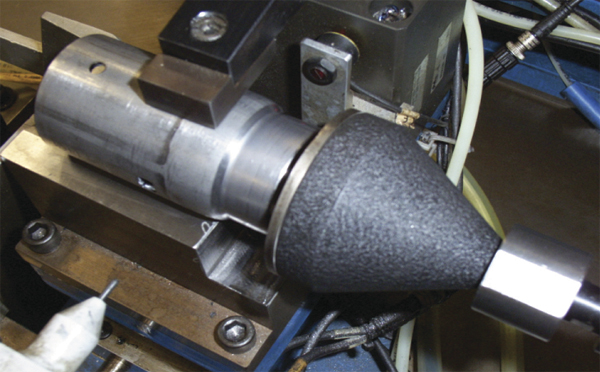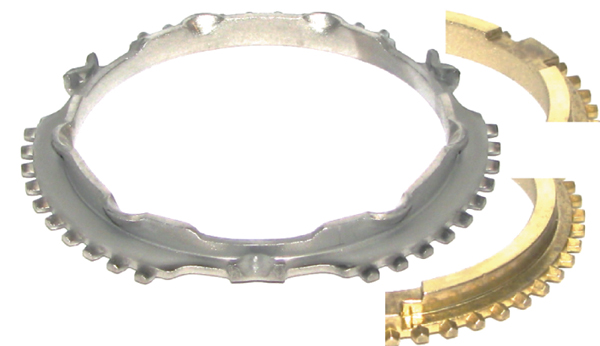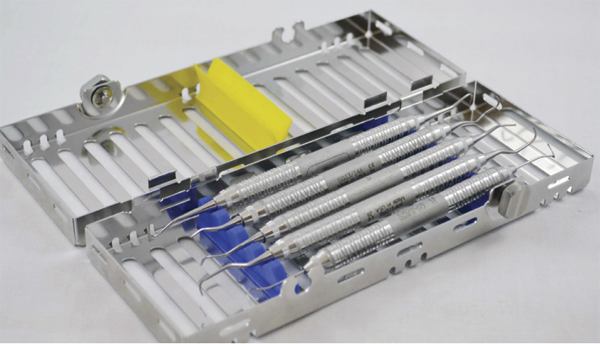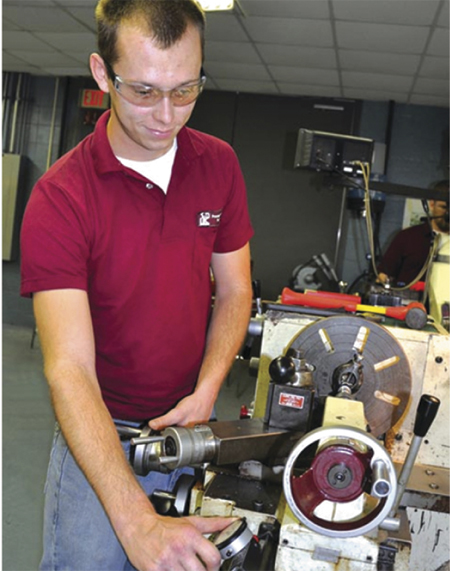Excellence in Process Control
Anchor Manufacturing Group
Anchor Manufacturing Group, Inc., Cleveland, OH, received the 2011 Link Systems Process Control Award for developing an automatic chamfer-measuring station to inspect parts. A required chamfer on the edge of an ID bore had become time consuming for Anchor technicians to inspect manually. Bore size is approximately 40 mm, held to a ±30 micron (0.0012-in.) tolerance. The boring operation machines a chamfer into the open end of the bore.
 Due to component part variation, chamfer depth can vary. To guarantee that the chamfer is present and within specification, Anchor sought to eliminate the use of a handheld chamfer gauge by modifying the gauge and incorporating it into a custom-made LVDT measuring assembly inside of the automated cell. A PLC tracks the parts in each station of the machine after they are bored and chamfered, and parts that fail in the chamfer inspection station are unloaded via a pick-and-place unit and isolated in a locked reject bin.
Due to component part variation, chamfer depth can vary. To guarantee that the chamfer is present and within specification, Anchor sought to eliminate the use of a handheld chamfer gauge by modifying the gauge and incorporating it into a custom-made LVDT measuring assembly inside of the automated cell. A PLC tracks the parts in each station of the machine after they are bored and chamfered, and parts that fail in the chamfer inspection station are unloaded via a pick-and-place unit and isolated in a locked reject bin.
Anchor’s solution for measuring chamfers exceeded inspection requirements and provides the customer with a consistent and reliable product.
The Process Control Award sponsored by Link Systems in Nashville, TN.
Excellence in Safety
Anchor Manufacturing Group
Anchor Manufacturing Group, Inc., Cleveland, OH, received the 2011 Pitcher Insurance Agency Safety Award for its outstanding safety and health program, which features an active safety committee, management commitment to a safe work environment and three incentive-based programs.
Anchor management maintains an open-door policy for reporting or suggesting ideas related to safety and health. Managers and supervisors take responsibility for ensuring that all operations are performed with the utmost regard for the safety and health of all personnel. In addition, the firm strictly enforces safety rules and requires that all employees comply with these rules as a condition of employment.
Anchor’s safety committee meets monthly and conducts quarterly departmental safety audits to ensure the use of safe work practices. The committee, which includes at least one member from each department, promptly and thoroughly investigates accidents to discover root cause and initiate corrective actions.
The safety program also includes three incentive-based initiatives—a No Lost-Time Accident Program, an Employee Excellence Program and a Safety Lunch Program. In 2008, Anchor implemented the No Lost-Time Accident Program and set a goal of zero lost-time accidents. Special safety boards hang throughout the plant and track the days the company has gone without such an accident. For every 90 days without a lost-time accident, the company holds a prize drawing for all eligible hourly associates. In addition, a prize drawing is held at each of the monthly departmental meetings. If an employee has an accident or receives a disciplinary action for a safety violation, he is not eligible for the drawing. The company’s record to date for days without a lost-time accident is 518 days.
Anchor’s Employee Excellence Program allows employees to earn points (equivalent to dollars) by completing certain tasks; points can be traded in for gift cards or for credit to purchase tools, Anchor merchandise, etc. As part of the program, each department sets its own unique safety-related goals, which are tracked on safety boards. For every 90-day period without an accident, department members receive 30 to 60 points; Anchor invests more than $40,000 annually on the program.
Lastly, Anchor rewards employees with celebratory lunches for meeting departmental safety goals. Depending on the goal that is met, employees may be treated to a pizza party, cookout or catered meal.
The company’s safety program has yielded outstanding results. In each of the last three years, Anchor was invited to attend the annual Occupational Safety and Hygiene Awards Banquet, sponsored by the Greater Cleveland Safety Council and the Ohio Bureau of Workers’ Compensation, where it received the Achievement Award, presented to companies that reduce their accident rate by 25 percent or more over the previous year. In addition, in 2011 Anchor won the Group Award for having the best safety record in its industry classification; the 100 percent Award for working the entire year without a lost-time injury or illness; and the prestigious Special Award for obtaining a minimum of 500,000 hours and six months without a lost-time accident.
The Safety Award is sponsored by Pitcher Insurance Agency, Chicago, IL.
Excellence in Product Development
Sulzer Friction Systems
Sulzer Friction Systems (U.S.) Inc., Dayton, OH, received the 2011 Ulbrich Award for Competitive Excellence in Product Development, for replacing a forged brass blocker ring with a stamped steel blocker ring, resulting in improved performance at a significantly lower cost. The blocker ring is a key element of the manual-transmission synchronizer system in GM pickup trucks, built in Mexico. The original forged brass blocker ring required machining on two surfaces to meet customer requirements, while the new steel part is stamped to net shape without the need for secondary operations.
 Several functional/performance improvements resulted from the stamped ring design, including reduced weight, inertia and thermal expansion (resulting in improved dimensional stability), with increased resistance to cracking and wear of the teeth and lugs.
Several functional/performance improvements resulted from the stamped ring design, including reduced weight, inertia and thermal expansion (resulting in improved dimensional stability), with increased resistance to cracking and wear of the teeth and lugs.
When considering all of the manufacturing and machining costs of the original part, costs related to stamping the steel part are one-third that of the original part. In addition, reliability of the stamping process has proved to be superior to that of the forging process. The stamped steel design also incorporates several unique innovations, including allowing for a much thinner cross-section that resulted in the steel ring being significantly lighter than the equivalent brass ring. Six centering bumps and three V-lug features were added to replace the thicker brass cross-section. In addition, the stamped steel ring can be nitrided at a nominal cost to dramatically improve wear resistance of the teeth and lugs.
The Product Development Award is sponsored by Ulbrich Stainless Steels and Special Metals, Inc., North Haven, CT.
Excellence in Quality
Pridgeon & Clay, Inc.
Pridgeon & Clay, Inc., Grand Rapids, MI, received the 2011 Waukesha Metal Products Excellence in Quality Award. At Pridgeon & Clay, nearly all departments have developed scorecards to monitor progress to established goals. The scorecard for the quality department has helped the department grow and accomplish goals far beyond expectations.
Recently, the quality department had determined that the company was spending a significant amount of money on gauge development after completed build, and worked to cut this cost in half by revamping its gauge-build process. To accomplish this, technicians were reassigned so that they could become experts in specific areas. A dimensional planning process was formalized to allow a cross-functional team to review a concept and part function, and develop a strategy for metrology that remains consistent. Formal approval is required by the team as a key milestone.
In addition, during the past few years Pridgeon & Clay has maintained single-digit PPM, and reorganized its quality department to accommodate increasing internal requirements resulting from building its own dies, and increasing external requirements for part quality and PPAP detail. The firm had to reexamine scheduling to support die runoffs that previously were performed at die shops. An extra load had been placed on the part-layout group due to multiple layouts, as well as the gauge-technician group when all gauge certifications began being completed inhouse. It was determined that one off-shift technician would relieve the part-checking activity of the CMM programmers and keep the CMMs running on routine items and annual validations on second shift. In addition, one technician was moved to third shift where she can use the CMMs nearly full time.
Pridgeon & Clay also evaluated its internal quality processes and found that the cost of these processes was much higher than in previous years, due to increasing customer-specific requirements for PPAP. Based on 200 new-product kickoffs per year during the last three years, Pridgeon & Clay decided to pursue a nearly $1.2 million cost avoidance. In doing so, cost calculations were reviewed and the quote and sales groups now incorporate these costs into their original quotes, with no negative feedback from customers.
The Quality Award is one sponsored by Waukesha Metal Products, Sussex, WI.
Excellence in Productivity
Waukesha Metal Products
Waukesha Metal Products, Sussex, WI, received the 2011 Zierick Manufacturing Corporation Productivity Award for its efforts to significantly increase productivity and reduce piece-part price when fabricating high-volume stainless steel cassettes designed to hold dental instruments. Due to cosmetic and burr-free requirements on the brushed-finish type 304 stainless-steel assemblies, existing cassettes had been manufactured using a labor-intensive seven-step fabrication process that included sanding, removing a PVC protective coating, using protective film and taking extreme care to ensure scratch-free surfaces.
 Initially the firm felt that stamping the cassettes complete in a progressive die was not possible, so it sought to eliminate some secondary operations by stamping the flat blanks in a progressive die. The concept, which involved running the blanks through a deburring machine and forming them in a form tool or press brake, would yield a 10 to 20 percent cost savings for the customer.
Initially the firm felt that stamping the cassettes complete in a progressive die was not possible, so it sought to eliminate some secondary operations by stamping the flat blanks in a progressive die. The concept, which involved running the blanks through a deburring machine and forming them in a form tool or press brake, would yield a 10 to 20 percent cost savings for the customer.
Going back to the drawing board, Waukesha’s engineering staff eventually developed a progressive-die concept to complete the cassettes, eliminating the need for additional steps to remove scratches or burrs before a final electropolish process. The completed tool incorporates unique design elements, including nonmarking form details and coining stations to completely remove burrs. Sensor technology built into the tool includes short feed/long feed, part out and stripper sensors on each corner.
Waukesha also tested several tool coatings to find the optimum combination of steel type and coating for the form details. These features, combined with the ability to program the servo-press ram speed during forming, have yielded burr-free finished parts stamped complete in the progressive die without any visible wipe/form marks. The improved process resulted in a six-month return on investment for the customer, and a 70-percent reduction in piece-part cost has allowed the parts to immediately become competitive for export to the Asian market. Further, Waukesha has enjoyed a 30-percent savings in raw-material costs and reduced the number of direct labor hours needed to produce a typical order from 75 hr. to less than 3 hr.
The Productivity Award is sponsored by Zierick Manufacturing Corp., Mount Kisco, NY.
Excellence as an Educational Institution
Southwestern Illinois College
Southwestern Illinois College (SWIC), Granite City, IL, received the 2011 Clips & Clamps Industries Educational Institution Award for its Precision Machining Technology (PMT) program, which offers a 2-yr. Associate in Applied Science degree and a 1-yr. Certificate of Technology in Precision Machining.
 As recently as the 2007-2008 academic year, SWIC’s industrial machining program had only three students enrolled in its evening classes. The school, under the direction of its new dean Brad Sparks, developed a 3-yr. plan to restructure its technical programs. Sparks hired a new coordinator of industrial technology, Mark Bosworth, to execute the plan. Bosworth, who has more than 10 years’ experience as a tool and die maker and has spent nearly 15 years teaching precision machining technology, revised the outdated industrial machining curriculum into the new PMT program.
As recently as the 2007-2008 academic year, SWIC’s industrial machining program had only three students enrolled in its evening classes. The school, under the direction of its new dean Brad Sparks, developed a 3-yr. plan to restructure its technical programs. Sparks hired a new coordinator of industrial technology, Mark Bosworth, to execute the plan. Bosworth, who has more than 10 years’ experience as a tool and die maker and has spent nearly 15 years teaching precision machining technology, revised the outdated industrial machining curriculum into the new PMT program.
During his first year at SWIC, Bosworth visited nearly every high school in the college’s large district to recruit students. He would eventually visit high schools in neighboring college districts as well, and then conducted a week-long workshop for high-school teachers that included tours of manufacturing facilities, instruction in machining skills and an exchange of curriculum.
SWIC created banners that hang in high schools marketing its manufacturing programs and advertising its partnership with the schools. College vans transport high school students to and from the campus for tours of shops and classrooms. In addition, Bosworth has extended an open invitation from PMA member company Ehrhardt Tool & Machine Co. to bring high school students on tours of its modern manufacturing facility. In recent months, 20 high schools have been contacted about the program and SWIC has increased the number of courses that students can take as dual enrollees of their high schools and SWIC.
The college’s budget alone was not sufficient to purchase the equipment needed to launch the new PMT program, so Bosworth and Sparks sought industry support. Several companies have donated equipment and supplies, and industry support for the program continues to grow. SWIC boasts a Precision Machining Technology Advisory Committee that includes more than 50 representatives from industry who meet twice per year to help guide program development. With the support of the advisory committee, Bosworth applied for and received certification by the National Institute of Metalworking Skills (NIMS). To date, 12 students have earned this challenging certification.
In three years, SWIC’s PMT program has undergone a remarkable transformation, evolving from an industrial machining curriculum based mostly on out-of-date manual lathes and milling machines to a program with students working on state-of-the-art equipment that they will use in the industry. Total enrollment in the program continues to grow each semester, from three students in 2007-2008 to 28 in 2010-2011.
The Educational Institution Award is sponsored by Clips & Clamps Industries, Plymouth, MI, and funded by the Dul Foundation.
Are You a Winner in 2012?
Share your success—and brag a little—by submitting an entry for PMA’s Awards of Excellence in Metalforming 2012. It’s your chance to recognize employees and earn industry recognition. To learn more, visit www.pma.org/awards, or contact PMA’s Christie Carmigiano at 216/901-8800, ccarmigiano@pma.org. MF
Industry-Related Terms: Brass,
Burr-Free,
Coining,
Corner,
Die,
Drawing,
Edge,
Form,
Forming,
Gauge,
Nominal,
Ram,
Stainless Steel,
Stripper,
ToleranceView Glossary of Metalforming Terms Technologies: Management, Quality Control, Safety
 PMA honored the following companies with a special plaque, commemorative flag and $1500 cash prize on November 13, 2011, during the PMA Fall Leadership Conference and Annual Meeting in Chicago, IL. Here we describe this year’s winning entries, and congratulate these companies that have dedicated themselves to continuous improvement.
PMA honored the following companies with a special plaque, commemorative flag and $1500 cash prize on November 13, 2011, during the PMA Fall Leadership Conference and Annual Meeting in Chicago, IL. Here we describe this year’s winning entries, and congratulate these companies that have dedicated themselves to continuous improvement. 










